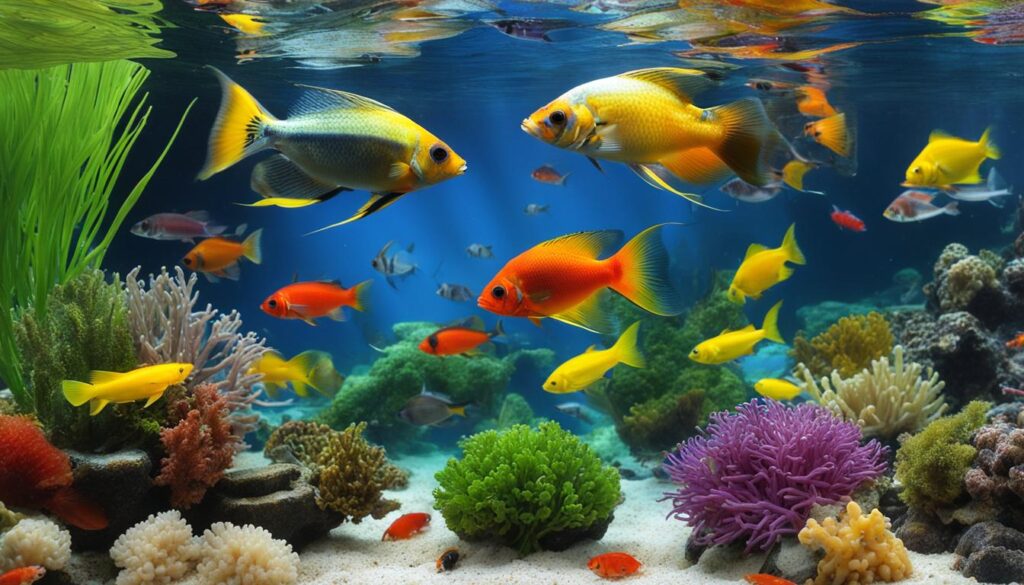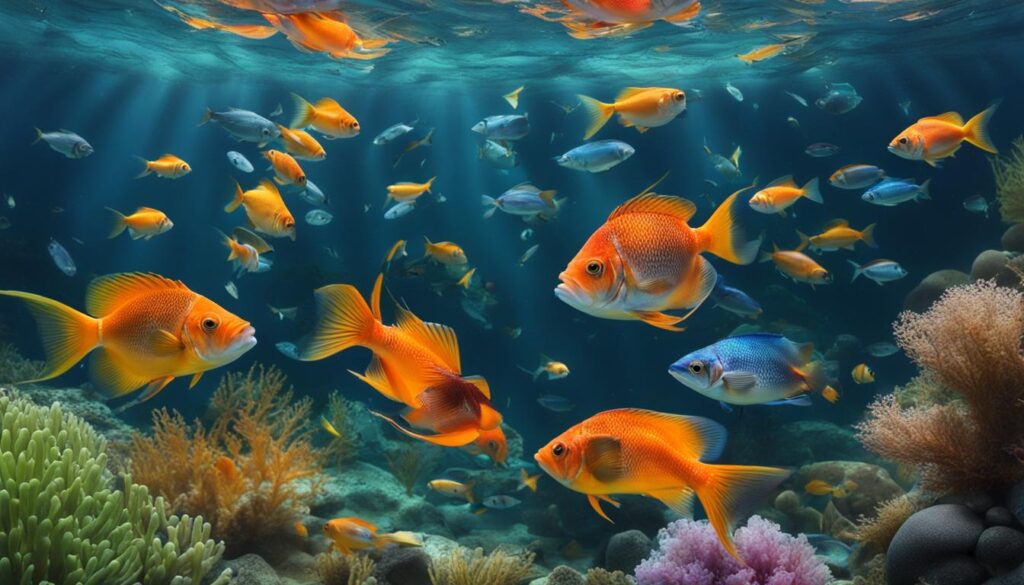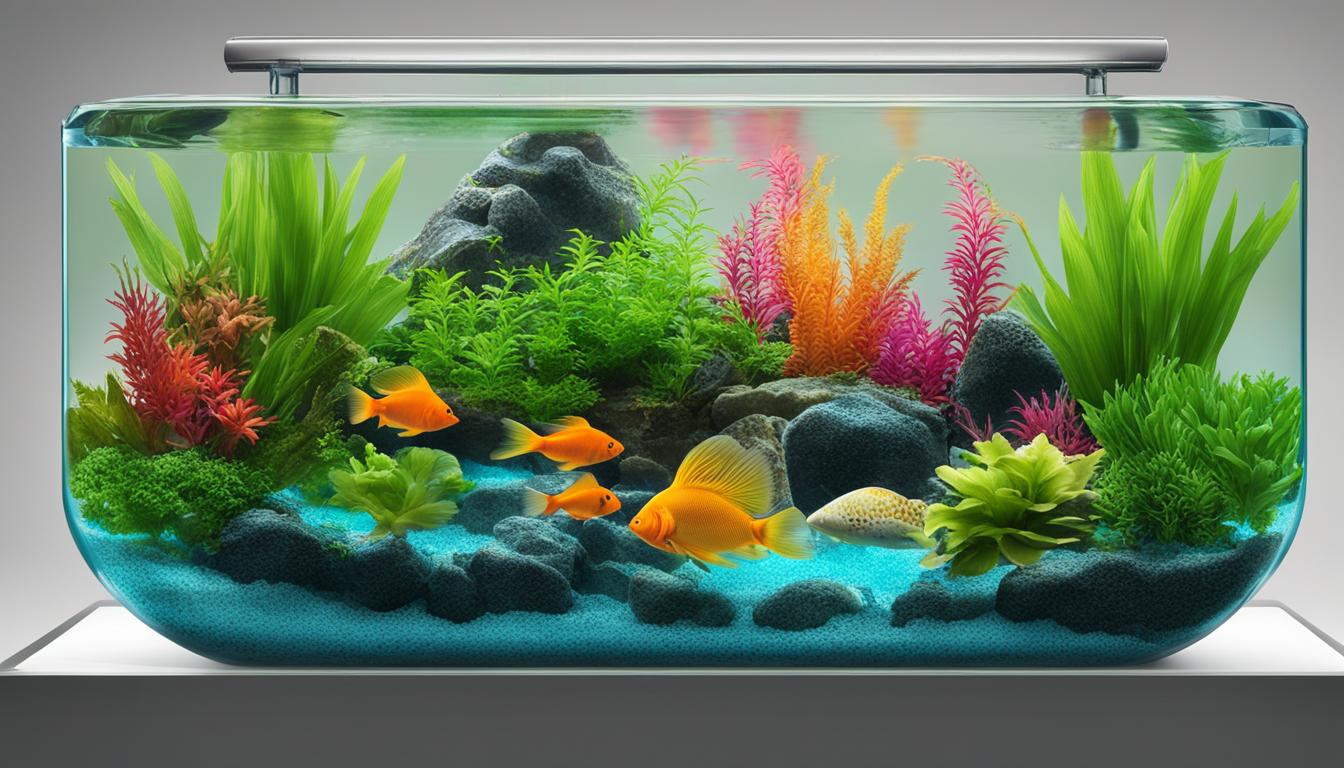Feeding Finesse: Meeting the Dietary Needs of Your Pet Fish
Welcome to our article series on pet fish care! In this first section, we will explore the importance of meeting the dietary needs of your exotic fish. Providing proper nutrition plays a vital role in promoting their growth, ensuring overall health, and preventing potential health problems. By understanding their specific dietary requirements, you can provide a balanced diet and create a feeding schedule that will keep your pet fish happy and healthy.
Key Takeaways:
- Pet fish require a balanced diet to thrive and prevent health issues.
- Understanding the specific dietary needs of different fish species is crucial for their optimal growth.
- Establishing a feeding schedule and following feeding guidelines is essential for their overall health.
- Providing both commercial fish food and live/frozen foods ensures a varied diet and meets their nutritional needs.
- Avoid common mistakes such as overfeeding or neglecting to provide a varied diet.
The Importance of Proper Nutrition for Pet Fish
Proper nutrition is crucial for the health and well-being of pet fish. Just like any other living beings, pet fish require a balanced diet that provides them with essential nutrients necessary for their growth and development. Without the proper nutrients, they may suffer from malnutrition and other health issues.
Exotic fish species, in particular, may have specific dietary needs that must be met to ensure their optimal health. These needs can vary from live or frozen foods to different types of commercial fish food. It is important for pet fish owners to understand and cater to the specific nutritional requirements of their fish species.
To help you better understand the importance of optimal fish nutrition, here are some essential nutrients that pet fish need:
| Nutrients | Function | Food Sources |
|---|---|---|
| Protein | Supports growth, repair, and overall health | Brine shrimp, bloodworms, fish pellets |
| Fats | Provides energy and supports organ function | Salmon, herring, fish oil |
| Carbohydrates | Offers energy for daily activities | Wheat germ, peas, sweet potatoes |
| Vitamins | Aids in essential bodily functions | Fruits, vegetables, fortified fish food |
| Minerals | Supports bone health, electrolyte balance, and overall well-being | Calcium, magnesium, potassium |
By providing your pet fish with a balanced diet that consists of the right nutrients, you can ensure their optimal growth and overall health. It is best to consult with a veterinarian or fish expert to determine the specific nutritional requirements of your pet fish.
Remember, proper nutrition is the key to promoting thriving pet fish, and it is crucial to feed them a balanced diet that meets their essential nutritional needs.
Understanding the Dietary Needs of Exotic Fish
Each exotic fish species has specific dietary requirements that must be met for them to thrive. Researching and understanding the needs of your specific fish species is crucial. Some fish may require live or frozen foods, while others can thrive on commercial fish food. It is important to provide a varied and balanced diet to ensure that they receive all the necessary nutrients for proper growth and health.
When it comes to pet fish nutrition, it’s essential to consider the specific requirements of exotic fish. Different species may have unique dietary needs that must be met to promote their well-being and proper growth. Understanding these needs will help ensure that your pet fish receive the best diet for optimal health.
Some exotic fish species thrive on live or frozen foods, such as brine shrimp, bloodworms, or daphnia. These foods mimic their natural diet and provide essential nutrients. Research the dietary preferences of your fish species to provide them with the appropriate live or frozen foods.
On the other hand, there are exotic fish species that can thrive on commercially available fish food. These high-quality fish foods are specially formulated to provide the necessary nutrients for proper growth and overall health. Look for fish food brands that offer a wide range of options for different fish species and sizes. This will help ensure that your exotic fish receive a balanced diet.
Additionally, it is important to provide a varied diet for your exotic fish. Including a mix of different types of fish food, such as pellets, flakes, and freeze-dried options, can help prevent nutritional deficiencies and promote healthy growth. Feeding a variety of foods also adds enrichment and enhances their feeding behavior.
| Exotic Fish Species | Dietary Requirements |
|---|---|
| Guppies | High-quality flakes, freeze-dried brine shrimp or daphnia, occasional live food |
| Discus Fish | High-quality pellets, frozen bloodworms or beef heart, occasional live food |
| Angelfish | Pellets, flakes, frozen brine shrimp or spirulina, occasional live food |
It’s crucial to feed your exotic fish the appropriate amount of food based on their size and dietary needs. Overfeeding can lead to obesity and health issues, while underfeeding can result in malnutrition. Follow the recommended feeding guidelines provided by experts or consult with your local aquarium store for specific instructions.
Remember to monitor your fish’s feeding behavior and adjust the amount of food accordingly. Uneaten food should be removed from the tank to prevent water pollution. Maintaining water quality is essential for the overall health and well-being of your exotic fish.
Key Takeaways:
- Each exotic fish species has specific dietary requirements that must be met for them to thrive.
- Researching and understanding the needs of your specific fish species is crucial.
- Some fish may require live or frozen foods, while others can thrive on commercial fish food.
- Provide a varied and balanced diet to ensure that your exotic fish receive all the necessary nutrients for proper growth and health.
- Monitor feeding behavior, adjust the amount of food accordingly, and remove uneaten food to maintain water quality.

Feeding Guidelines for Pet Fish
Establishing a feeding schedule and following feeding guidelines is essential for the overall health of your pet fish. Proper nutrition is crucial to ensure they receive a balanced diet and all the necessary nutrients for optimal health and growth.
Overfeeding is a common mistake that many pet fish owners make. Feeding your fish excessively can lead to obesity and various health issues. On the other hand, underfeeding can result in malnutrition and stunted growth. It is important to find the right balance and feed your fish the appropriate amount of food based on their size, species, and dietary needs.
A healthy fish diet comprises a variety of food types to provide a balanced nutritional profile. Commercial fish food is a convenient option and can serve as the foundation of their diet. Look for high-quality fish pellets or flakes that are specifically formulated for your fish species. These commercial foods are often fortified with essential nutrients that promote healthy development.
In addition to commercial fish food, incorporating live or frozen foods can enhance the nutritional value of their diet. Many fish species thrive on live or frozen brine shrimp, bloodworms, or daphnia. These foods offer natural enrichment and mimic their diet in the wild, contributing to their overall well-being.
“Proper nutrition is key to ensuring the long-term health and vitality of your pet fish.”
Regularly monitoring your fish’s appetite is crucial to adjust their feeding schedule and portion sizes accordingly. Observe their behavior during feeding times and make sure they consume all the food within a few minutes. If there is excessive food left uneaten, it becomes crucial to remove it promptly to prevent water pollution.
To summarize, here are some feeding guidelines for your pet fish:
- Establish a feeding schedule and stick to it consistently.
- Feed your fish small, frequent meals rather than one large feeding.
- Offer a balanced diet that includes quality commercial fish food and supplementary live or frozen foods.
- Monitor your fish’s appetite and adjust the amount of food accordingly.
- Remove any uneaten food promptly to maintain water quality.
Incorporating these feeding guidelines into your pet fish’s care routine will promote their overall health and well-being. Remember, a balanced diet is essential for their growth, vitality, and longevity.
Tips for Proper Fish Feeding
Feeding your pet fish properly is essential for their overall health and well-being. By following these helpful tips, you can ensure that your fish receive a balanced diet and stay healthy:
Avoid Overfeeding
One of the most common mistakes pet fish owners make is overfeeding. It’s important to provide small, frequent meals instead of one large feeding. This helps prevent overeating and obesity in your fish. Pay attention to your fish’s appetite and adjust the amount of food accordingly. Remember, it’s better to slightly underfeed than to overfeed.
Remove uneaten food
After feeding your fish, always remove any uneaten food from the tank. Leaving leftover food in the tank can lead to water pollution and affect the water quality. Use a net or siphon to carefully remove any excess food to maintain a clean and healthy environment for your fish.
Provide a Balanced Diet
Just like humans, fish require a balanced diet to meet their nutritional needs. It’s important to provide a variety of food types to ensure they receive all the necessary nutrients. Include high-quality commercial fish food as the staple part of their diet, as it is formulated to meet their specific nutritional requirements. Additionally, supplement their diet with live or frozen foods such as brine shrimp or bloodworms. This variety ensures that your fish get a diverse range of nutrients for optimal health.
Remember to always research the specific dietary needs of your fish species, as different species may have different requirements. Providing a balanced diet and following these feeding tips will keep your pet fish healthy and thriving.

Recommended Fish Foods
| Food Type | Benefits |
|---|---|
| High-Quality Commercial Fish Food | Formulated to meet the nutritional needs of pet fish, convenient to use, and widely available. |
| Live or Frozen Foods | Provides variety and mimics the natural diet of fish, offers essential nutrients not found in commercial food. |
| Vegetables | Great for herbivorous fish and provides fiber and essential vitamins. |
| Insects or Worms | Rich in protein and stimulates natural hunting behaviors in fish. |
Common Nutritional Mistakes to Avoid
When it comes to pet fish nutrition, there are some common mistakes that owners should be aware of and avoid. These mistakes can have a significant impact on the health and well-being of your fish. By understanding and addressing these mistakes, you can ensure that your pet fish receives the balanced diet they need for optimal nutrition and overall health.
Feeding Only One Type of Food
Feeding only one type of food, such as flakes, can lead to nutritional deficiencies in pet fish. While flakes may be a convenient option, they may not provide all the essential nutrients that your fish needs. It is important to diversify their diet and incorporate a variety of food types, including pellets, freeze-dried or frozen foods, and live foods. This will help ensure that your fish receives a wide range of nutrients necessary for their growth and well-being.
Neglecting to Provide a Varied Diet
Just like humans, pet fish can get bored with eating the same thing day after day. Neglecting to provide a varied diet can result in loss of appetite and a decline in overall health. Adding different food options to your fish’s diet can stimulate their natural feeding behaviors and make mealtime more interesting. Offer a combination of dry and wet foods to keep their diet exciting and promote a robust appetite.
Overfeeding and Underfeeding
Both overfeeding and underfeeding can have negative consequences for your pet fish. Overfeeding can lead to obesity, poor water quality, and a higher risk of health issues such as bloating or swim bladder disease. On the other hand, underfeeding can result in malnutrition and stunted growth. It is important to find the right balance and feed your fish the appropriate amount of food based on their size, species, and individual needs. Monitor their feeding habits and adjust the quantity accordingly.
Educate Yourself on Nutritional Needs
To provide the best nutrition for your pet fish, take the time to educate yourself on their specific nutritional needs. Different fish species have different dietary requirements, so it is important to research and understand the needs of your particular fish. Consult with experts or reputable sources to learn about the optimal fish nutrition for your specific species. By doing so, you can make informed decisions and ensure that your fish receives a balanced diet that meets their unique needs.
To summarize, avoiding these common nutritional mistakes is essential for providing a balanced diet that meets the optimal nutrition needs of your pet fish. By diversifying their diet, addressing feeding habits, and staying informed about their specific nutritional requirements, you can help your fish maintain good health and thrive in their aquatic environment.
Remember, a healthy diet is the foundation for a healthy pet fish.
| Mistakes to Avoid | Consequences |
|---|---|
| Feeding only one type of food | Nutritional deficiencies |
| Neglecting to provide a varied diet | Loss of appetite, decline in overall health |
| Overfeeding | Obesity, poor water quality, increased health risks |
| Underfeeding | Malnutrition, stunted growth |
Conclusion
Providing a balanced diet is essential for meeting the dietary needs of your pet fish and ensuring their optimal health and well-being. By understanding the specific dietary requirements of your fish species, establishing a feeding schedule, and following feeding guidelines, you can promote their growth and longevity. Remember to research and educate yourself about the needs of your fish species to provide the best care possible.
Feeding your pet fish a variety of food types is key to a balanced diet. This can include commercial fish food, live, or frozen foods. By offering a diverse range of food options, you can ensure that your fish receive all the essential nutrients they need to thrive. Additionally, it is important to monitor their appetite and adjust the amount of food accordingly to prevent overfeeding or underfeeding.
To maintain a healthy and clean environment for your pet fish, remove any uneaten food from the tank to prevent water pollution. This will help preserve water quality and prevent the growth of harmful bacteria. Providing a clean and well-maintained tank, along with a balanced diet, will contribute to the overall health and happiness of your beloved fish.
FAQ
Why is proper nutrition important for pet fish?
Proper nutrition is crucial for the health and well-being of pet fish. A balanced diet that provides essential nutrients is necessary for their growth and development. Neglecting to meet the nutritional needs of pet fish can lead to malnutrition and other health problems.
How can I meet the dietary needs of my exotic fish?
Each exotic fish species has specific dietary requirements that must be met for them to thrive. It is important to research and understand the needs of your specific fish species. Some fish may require live or frozen foods, while others can thrive on commercial fish food. Providing a varied and balanced diet will ensure they receive all the necessary nutrients for proper growth and health.
What is a feeding schedule and why is it important?
A feeding schedule is a set routine for when and how to feed your pet fish. Establishing a feeding schedule and following feeding guidelines is essential for the overall health of pet fish. Overfeeding can lead to obesity and health issues, while underfeeding can result in malnutrition. It is important to feed them the appropriate amount of food based on their size, species, and dietary needs.
What are some tips for proper fish feeding?
When feeding your pet fish, it is important to avoid overfeeding by providing small, frequent meals instead of one large feeding. Monitor their appetite and adjust the amount of food accordingly. It is also important to remove any uneaten food from the tank to prevent water pollution. Providing a balanced diet that includes both commercial fish food and live/frozen foods will help ensure their nutritional needs are met.
What are common nutritional mistakes to avoid?
Feeding only one type of food, neglecting to provide a varied diet, overfeeding, and underfeeding are common nutritional mistakes to avoid. Feeding only flakes or one type of food can lead to nutritional deficiencies. Neglecting to provide a varied diet can result in boredom and loss of appetite. Overfeeding can cause health issues, while underfeeding can lead to malnutrition. It is important to educate oneself about the specific nutritional needs of their pet fish and provide a balanced diet to avoid these pitfalls.
How can I ensure I am meeting the dietary needs of my pet fish?
Providing proper nutrition is crucial for meeting the dietary needs of pet fish. Understanding their specific dietary requirements, establishing a feeding schedule, and following feeding guidelines are all important steps in ensuring their optimal health and well-being. By providing a balanced diet that includes a variety of food types, pet fish can grow and thrive, leading to a long and healthy life.

